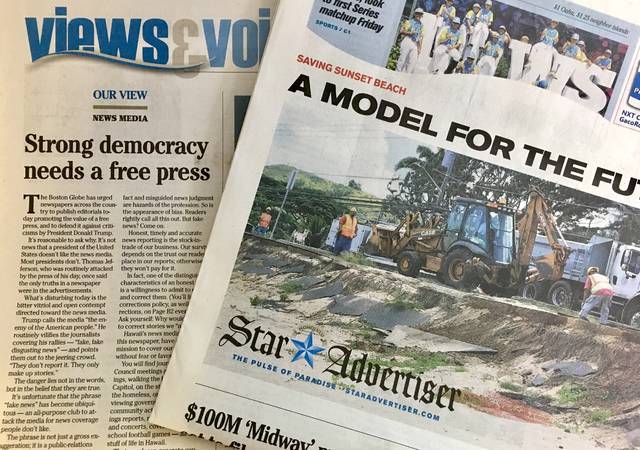Editorial: Strong democracy needs a free press

HONOLULU STAR-ADVERTISER
The Boston Globe has urged newspapers across the country to publish editorials today promoting the value of a free press, and to defend it against criticisms by President Donald Trump.
The Boston Globe has urged newspapers across the country to publish editorials today promoting the value of a free press, and to defend it against criticisms by President Donald Trump.
It’s reasonable to ask why. It’s not news that a president of the United States doesn’t like the news media. Most presidents don’t. Thomas Jefferson, who was routinely attacked by the press of his day, once said the only truths in a newspaper were in the advertisements.
What’s disturbing today is the bitter vitriol and open contempt directed toward the news media.
Trump calls the media “the enemy of the American people.” He routinely vilifies the journalists covering his rallies — “fake, fake disgusting news” — and points them out to the jeering crowd. “They don’t report it. They only make up stories.”
The danger lies not in the words, but in the belief that they are true.
It’s unfortunate that the phrase “fake news” has become ubiquitous — an all-purpose club to attack the media for news coverage people don’t like.
Don't miss out on what's happening!
Stay in touch with breaking news, as it happens, conveniently in your email inbox. It's FREE!
The phrase is not just a gross exaggeration; it is a public-relations weapon used by government officials and their acolytes to deliberately and methodically erode trust in a news media they can’t control. Such efforts undermine one of the cornerstones of American democracy, and cannot be tolerated.
The value of a free and independent press, able and willing to question government authority, was recognized by the Founding Fathers. It was singled out for protection in the First Amendment: “Congress shall make no law … abridging the freedom of speech, or of the press.”
Jefferson famously said: “Were it left to me to decide whether we should have a government without newspapers or newspapers without a government, I should not hesitate a moment to prefer the latter.”
Of course, there is no denying that the media, covering fast- breaking news events on a 24-hour cycle, will make mistakes. Errors of fact and misguided news judgment are hazards of the profession. So is the appearance of bias. Readers rightly call all this out. But fake news? Come on.
Honest, timely and accurate news reporting is the stock-in-trade of our business. Our survival depends on the trust our readers place in our reports; otherwise they won’t pay for it.
In fact, one of the distinguishing characteristics of an honest press is a willingness to admit to errors and correct them. (You’ll find our corrections policy, as well as corrections, on Page B2 every day.) Ask yourself: Why would we strive to correct stories we “make up”?
Hawaii’s news media, including this newspaper, have an enduring mission to cover our communities without fear or favor.
You will find journalists at City Council meetings and public hearings, walking the halls of the state Capitol, on the streets talking to the homeless, on the phone interviewing government officials and community activists, reading earnings reports, reviewing restaurants and concerts, covering high school football games — all the stuff of life in Hawaii.
Their work can generate conflicts, to be sure. Hawaii journalists have cast a spotlight on everything from the Bishop Estate scandal to organized crime to political cronyism in the Legislature. They have questioned those in power and held them to account.
They have endured criticism and public attacks by self-interested parties. Sometimes they are unfairly accused of bias by people who don’t understand the difference between our editorials — opinion pieces prepared by a separate Editorial Board — and news stories.
Nonetheless, journalists of a free press continue to probe, question and report on stories that otherwise wouldn’t see the light of day. They are your independent representatives in the community, reporting back on what they’ve seen and heard. They do not serve the president or any political party or ideology. They serve you.



